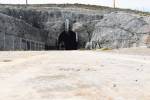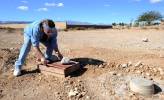Yucca missing from plan to remake nuclear waste policy
WASHINGTON -- Nevada senators seeking to redirect the nation away from Yucca Mountain introduced a bill Thursday that would create a nine-member expert panel to overhaul nuclear waste policy.
Sens. Harry Reid and John Ensign proposed a blue ribbon commission that would be given two years to plot a direction for how highly radioactive materials should be managed. The waste -- more than 56,000 tons of it and growing -- now is stored at power plants and government facilities in 39 states.
The legislation was structured by the Nevada senators to develop other choices besides Yucca Mountain, 100 miles northwest of Las Vegas, that has been the focus of the federal government's nuclear waste disposal efforts for the past 20 years.
It follows an announcement last month that President Barack Obama plans to dramatically scale back development of a proposed underground repository at the site, while seeking alternatives.
"This is a step that is way past due," said Reid, who is chief among Nevada elected leaders in contending the Yucca site is unsuitable and that the project was forced upon the state.
"I am pleased to say that we are closing the book on our nation's failed nuclear waste policy," Reid said. "And I am proud to say that I have been working on a new volume in this terribly difficult debate."
There was no immediate reaction from elsewhere in Congress. The Nevada senators introduced the bill with no other co-sponsors. They could try to attach it as an amendment to an energy bill scheduled to be formed later this month.
Now that Obama and Energy Secretary Steven Chu have agreed to seek new advice on nuclear waste, the bill by Reid, a Democrat, and Ensign, a Republican, seeks to move that along while retaining for the Nevadans a role in the process.
Reid, who is the Senate majority leader, could have a voice in appointing most of the commissioners, including naming its chairman with House Speaker Nancy Pelosi, D-Calif.
While the legislation does not say specifically, Reid aides said the commission would be instructed to disregard Yucca Mountain as it performs its work. Under the bill, Democrats in Congress would choose five members including its leader, and Republicans would choose four.
The bill foresees no formal role for the Obama administration in setting up or operating the commission, although the panel could accept staffers from the Energy Department.
The bill would require appointees to have "national recognition and significant depth" in engineering, used nuclear fuel management, energy, government service environmental policy, law, public administration or foreign affairs. DOE contractors, federal, state or local officials could not be considered.
Chu has told Congress in recent appearances that he is taking steps to form a nuclear waste study commission, and it was not immediately clear how the efforts would jibe. The Energy Department was notified of the pending bill, but congressional aides said the administration played a limited role in writing it.
In order to satisfy calls from Republicans for quick action on alternatives, Chu for instance has said he would like to receive study recommendations by the end of this year. The Reid-Ensign bill calls for a two-year study, with an interim report due to Congress in one year.
"Secretary Chu agrees with Senator Reid on the need to bring together the best scientific minds and key stakeholders to help develop a thoughtful, responsible nuclear waste management strategy," DOE spokeswoman Stephanie Mueller said in a statement.
The Nuclear Energy Institute, the government relations arm of the nuclear industry, also has called for a blue ribbon panel to develop a "Plan B" if the Obama administration abandons the Nevada repository. A Reid aide said NEI had no input into the legislation.
Steve Kraft, NEI waste management director, said including Obama input to the study group would allow for "a joint effort between the administration and Congress. Because otherwise, don't you risk competing missions?"
The commission set by the Reid-Ensign bill would be charged with examining a range of issues that have grown around the nuclear waste program in recent years. Those would include whether the government could take ownership of waste and keep it stored at nuclear reactor sites, or whether a centralized site or regional sites could be established where material could be gathered.
The experts also would recommend how to dispose of 22,000 canisters of solid nuclear waste generated by government weapons programs. That waste is stored in Idaho, Washington state and South Carolina.
The commission would assess the research being done on nuclear waste reprocessing and other advanced methods of managing the material. It also would examine possible cost sharing between the government and private industry on nuclear waste research.
Experts also would examine what might be done about a largely untapped nuclear waste fund where fees collected from utility ratepayers have accumulated to a balance of more than $20 billion. They also would be asked to assess whether the nuclear waste disposal program should be moved from the Department of Energy to a government corporation.
Contact Stephens Washington Bureau Chief Steve Tetreault at stetreault@ stephensmedia.com or 202-783-1760.























